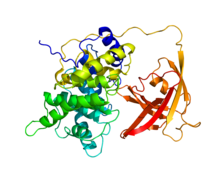|
Il fattore intrinseco (FI), o fattore gastrico antipernicioso, è una glicoproteina secreta dalle cellule parietali delle ghiandole ossintiche, nella mucosa gastrica. Esso fu scoperto dal clinico americano William Bosworth Castle.
Esso è necessario all'assorbimento della vitamina B12. Di conseguenza la perdita delle cellule che lo secernono, causata da processi autoimmuni, determina la comparsa del quadro di anemia perniciosa propriamente detta, causata da deficit di vitamina B12 e dunque difetto di maturazione dei blasti nel midollo ematopoietico. L'anemia perniciosa è propriamente un'anemia megaloblastica, caratterizzata da cellule ipertrofiche, turnover dei globuli rossi più rapido e scarso sviluppo nucleare. Il fattore intrinseco viene secreto dalle cellule parietali (ossintiche) in risposta agli stessi stimoli che determinano la secrezione di HCl (acido cloridrico). La secrezione del fattore intrinseco è l'unica funzione gastrica essenziale per la vita dell'uomo. I fattori che possono provocare carenza di questo fattore sono l'alcolismo, gastriti e, in generale, danni alla mucosa gastrica.
Condizioni iatrogene di carenza di fattore intrinseco comprendono l'assunzione cronica di inibitori di pompa protonica e interventi di chirurgia bariatrica, volti al dimagrimento del paziente, nei quali è prevista un'ampia resezione dello stomaco (p.e. sleeve gastrectomy). Per tale motivo i pazienti sottoposti a tali interventi devono assumere integrazioni di vitamina B12 (cianocobolamina) per il resto della vita. La stessa si può reperire in fiale da 5 000 µg (intramuscolare), da 1 000 µg (intramuscolare o sottocutanea), ma anche in gocce. Esistono anche prodotti in compresse da 1000 μg con l'aggiunta di 20 mg di fattore intrinseco per aiutarne l'assorbimento.
Bibliografia
- Berne & Levy, Fisiologia - sesta Ed. - 2010
- Howard TA, Misra DN, Grove M, et al., Human gastric intrinsic factor expression is not restricted to parietal cells, in J. Anat., vol. 189, Pt 2, 1996, pp. 303–13, PMC 1167747, PMID 8886952.
- Kozyraki R, Kristiansen M, Silahtaroglu A, et al., The human intrinsic factor-vitamin B12 receptor, cubilin: molecular characterization and chromosomal mapping of the gene to 10p within the autosomal recessive megaloblastic anemia (MGA1) region, in Blood, vol. 91, n. 10, 1998, pp. 3593–600, PMID 9572993.
- Wahlstedt V, Gräsbeck R, Cobalamin-binding proteins in human urine: identification and quantitation, in J. Lab. Clin. Med., vol. 106, n. 4, 1985, pp. 439–46, PMID 4045300.
- Remacha AF, Del Río E, Sardà MP, et al., Role of (Glu → Arg, Q5R) mutation of the intrinsic factor in pernicious anemia and other causes of low vitamin B12, in Ann. Hematol., vol. 87, n. 7, 2008, pp. 599–600, DOI:10.1007/s00277-008-0465-0, PMID 18338170.
- Ament AE, Li Z, Sturm AC, et al., Juvenile cobalamin deficiency in individuals of African ancestry is caused by a founder mutation in the intrinsic factor gene GIF, in Br. J. Haematol., vol. 144, n. 4, 2009, pp. 622–4, DOI:10.1111/j.1365-2141.2008.07496.x, PMC 2636683, PMID 19036097.
- Mathews FS, Gordon MM, Chen Z, et al., Crystal structure of human intrinsic factor: cobalamin complex at 2.6-A resolution, in Proc. Natl. Acad. Sci. U.S.A., vol. 104, n. 44, 2007, pp. 17311–6, DOI:10.1073/pnas.0703228104, PMC 2077253, PMID 17954916.
- Fedosov SN, Fedosova NU, Berglund L, et al., Composite organization of the cobalamin binding and cubilin recognition sites of intrinsic factor, in Biochemistry, vol. 44, n. 9, 2005, pp. 3604–14, DOI:10.1021/bi047936v, PMID 15736970.
- Gerhard DS, Wagner L, Feingold EA, et al., The Status, Quality, and Expansion of the NIH Full-Length cDNA Project: The Mammalian Gene Collection (MGC), in Genome Res., vol. 14, 10B, 2004, pp. 2121–7, DOI:10.1101/gr.2596504, PMC 528928, PMID 15489334.
- Tanner SM, Li Z, Perko JD, et al., Hereditary juvenile cobalamin deficiency caused by mutations in the intrinsic factor gene, in Proc. Natl. Acad. Sci. U.S.A., vol. 102, n. 11, 2005, pp. 4130–3, DOI:10.1073/pnas.0500517102, PMC 554821, PMID 15738392.
- Yassin F, Rothenberg SP, Rao S, et al., Identification of a 4-base deletion in the gene in inherited intrinsic factor deficiency, in Blood, vol. 103, n. 4, 2004, pp. 1515–7, DOI:10.1182/blood-2003-07-2239, PMID 14576042.
- Gordon MM, Brada N, Remacha A, et al., A genetic polymorphism in the coding region of the gastric intrinsic factor gene (GIF) is associated with congenital intrinsic factor deficiency, in Hum. Mutat., vol. 23, n. 1, 2004, pp. 85–91, DOI:10.1002/humu.10297, PMID 14695536.
- Strausberg RL, Feingold EA, Grouse LH, et al., Generation and initial analysis of more than 15,000 full-length human and mouse cDNA sequences, in Proc. Natl. Acad. Sci. U.S.A., vol. 99, n. 26, 2002, pp. 16899–903, DOI:10.1073/pnas.242603899, PMC 139241, PMID 12477932.
- Andersen CB, Madsen M, Storm T, et al., Structural basis for receptor recognition of vitamin-B(12)-intrinsic factor complexes, in Nature, vol. 464, n. 7287, 2010, pp. 445–8, DOI:10.1038/nature08874, PMID 20237569.
- Katz M, Lee SK, Cooper BA, Vitamin B 12 malabsorption due to a biologically inert intrinsic factor, in N. Engl. J. Med., vol. 287, n. 9, 1972, pp. 425–9, DOI:10.1056/NEJM197208312870902, PMID 5044916.
- Yazaki Y, Chow G, Mattie M, A single-center, double-blinded, randomized controlled study to evaluate the relative efficacy of sublingual and oral vitamin B-complex administration in reducing total serum homocysteine levels, in J Altern Complement Med, vol. 12, n. 9, novembre 2006, pp. 881–5, DOI:10.1089/acm.2006.12.881, PMID 17109579.
|
